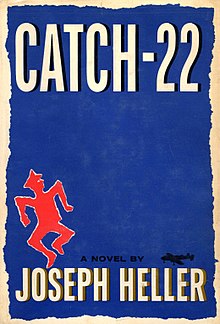Catch 22

First edition cover
|
|
| Author | Joseph Heller |
|---|---|
| Cover artist | Paul Bacon |
| Country | United States |
| Language | English |
| Genre |
Black humor Absurdist fiction Satire War fiction Historical fiction |
| Publisher | Simon & Schuster |
|
Publication date
|
10 November 1961 |
| Media type | Print (hardback) |
| Pages | 453 (1st edition hardback) |
| ISBN | |
| OCLC | 35231812 |
| 813/.54 22 | |
| LC Class | PS3558.E476 C3 2004 |
| Followed by | Closing Time (1994) |
|
|
Catch-22 is a satirical novel by American author Joseph Heller. He began writing it in 1953; the novel was first published in 1961. It is frequently cited as one of the greatest literary works of the twentieth century. It uses a distinctive non-chronological third-person omniscient narration, describing events from the points of view of different characters. The separate storylines are out of sequence so the timeline develops along with the plot.
The novel is set during World War II, from 1942 to 1944. It mainly follows the life of Captain John Yossarian, a U.S. Army Air Forces B-25 bombardier. Most of the events in the book occur while the fictional 256th Squadron is based on the island of Pianosa, in the Mediterranean Sea, west of Italy. The novel looks into the experiences of Yossarian and the other airmen in the camp, who attempt to maintain their sanity while fulfilling their service requirements so that they may return home.
The novel's title refers to a plot device that is repeatedly invoked in the story. Catch-22 starts as a set of paradoxical requirements whereby airmen mentally unfit to fly did not have to do so, but could not actually be excused. By the end of the novel, it is invoked as the explanation for many unreasonable restrictions. The phrase "Catch-22" has since entered the English language, referring to a type of unsolvable logic puzzle sometimes called a double bind. According to the novel, people who were crazy were not obliged to fly missions, but anyone who applied to stop flying was showing a rational concern for his safety and was, therefore, sane and had to fly.
...
Wikipedia
